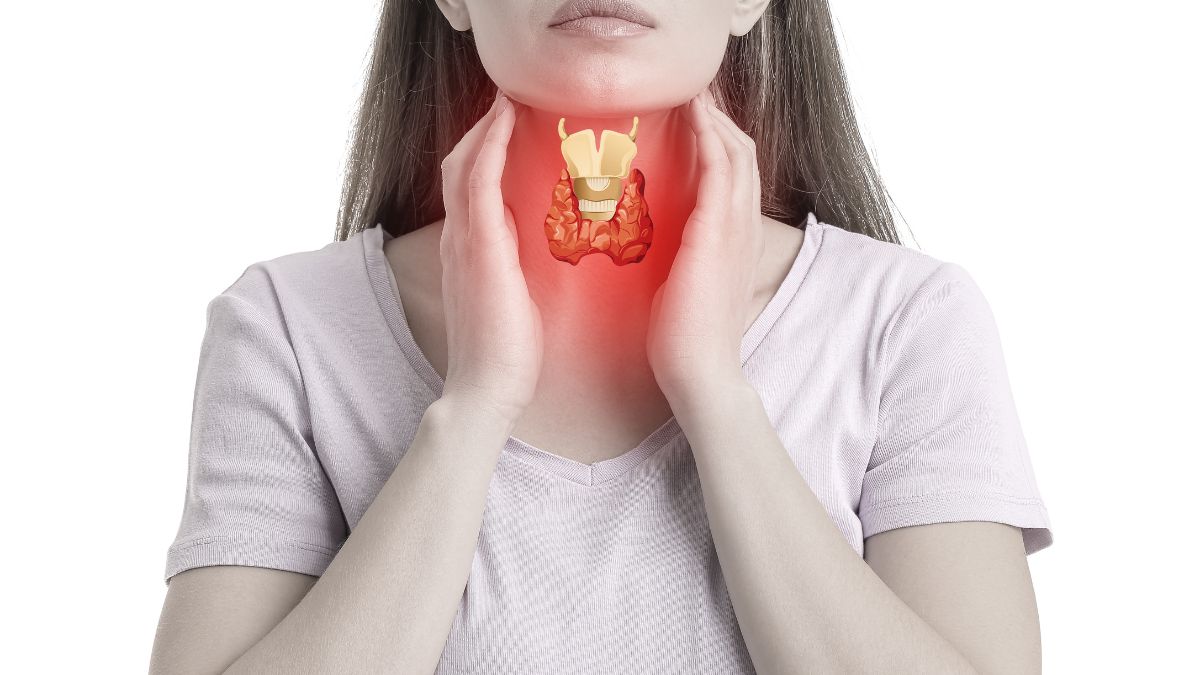- By Bornika Das
- Thu, 21 Aug 2025 08:20 PM (IST)
- Source:JND
Thyroid disorders are quickly becoming one of the most urgent worldwide public health issues, sneaking up on more than 200 million individuals worldwide with nearly imperceptible symptoms. Described by some as a "silent epidemic," these conditions can go undetected for years because of their gradual onset, but they disrupt several of the body's most critical functions, like metabolism, heart rate, energy, and even fertility. Women are especially at risk, thyroid disease being several times more prevalent in them than in men and with family history and increasing age also adding to the risk. From hypothyroidism and hyperthyroidism to autoimmune disorders such as Hashimoto's thyroiditis and Graves' disease, the increased prevalence reflects a compelling need for awareness and treatment.
What is so troubling about thyroid disease is how stealthy it is. Fatigue, weight gain or loss, anxiety, irregular menstruation or infertility are likewise discounted as lifestyle issues until timely diagnosis is sometimes too late. Regular screening and early diagnosis are the best methods to avoid severe complications, like cardiovascular disease, osteoporosis, infertility, and even life-threatening situations like myxedema coma or thyroid storm. In conversation with The Daily Jagran, Dr. Gopinath N, Consultant - Endocrinology, Manipal Hospital Varthur Road, shares that with the number of thyroid diseases continuing to rise globally, there is a need for active screening, more robust public health messages and increased emphasis on environmental and lifestyle risk factors that underpin this escalating epidemic.
Causes Of Rising Thyroid Disorders
The causes of the rising prevalence of thyroid disorders include a combination of genetic predispositions, environmental exposures, changes to lifestyle and improved diagnostic tools. Genetic factors determine about 70-80 per cent of the risk of developing autoimmune thyroid disease. People who have a personal or family history of thyroid disease are at much higher risk. Dr. Gopinath N mentions, “The exposure of toxic heavy metals such as Chromium, (Cr), Arsenic (As), Cadmium (Cd), Mercury (Hg), and Lead (Pb) has been linked to noncancerous diseases of the thyroid.” Radiation exposure is a well-established environmental risk factor for both autoimmune thyroid disease and thyroid cancer.
ALSO READ: Is It Just Fatigue Or Thyroid Disorder? Doctor Shares Warning Signs
Endocrine-disrupting chemicals, such as bisphenols, phthalates, perchlorate, dioxins, polychlorinated biphenyls, and organophosphate pesticides, widely used in paints, pottery, porcelain and the pesticide industry, are known to alter thyroid function.
It is important to maintain regular and sufficient iodine intake, as deficiency causes hypothyroidism and toxic multinodular goiter. Low selenium intake is associated with an increase in thyroid autoantibodies, and supplementation has shown a reduction in antibodies. Dr. Gopinath N mentions, “Cigarette smoking is linked to the onset of autoimmune hypothyroidism. Other lifestyle risk factors that impact thyroid function would be due to ultra-processed foods, microplastics, Obesity, Undereating/Overexercising, alcohol and Chronic stress.”

Thyroid Disorders As Rising Global Health Crisis (Image Credits: Canva)
Symptoms Of Thyroid Disorders
Untreated hypothyroidism can cause fatigue, unexpected weight gain, depression, cold intolerance and, in the most serious cases, heart disease or myxedema coma. On the other hand, untreated hyperthyroidism could present with anxiety, tachycardia, weight loss in the face of an increased appetite, increased prevalence of atrial fibrillation and a greater incidence of osteoporosis. Dr. Gopinath N states, “In women, thyroid disorder can cause major trouble in menstrual cycle length and regularity as well as significantly harm your fertility and your baby’s development after birth, which might also induce miscarriage, premature birth, and the child’s developmental problems.” This increasing impact shows an immediate need for better awareness and, radically, early detection.
Importance Of Early Detection Of Thyroid Disorders
As for higher-risk groups like women, older adults, and those with a family history of thyroid disease, getting routine thyroid screening is important. Dr. Gopinath N states, “If detected early, then it allows for early intervention, whether that is through hormone replacement therapy for hypothyroidism, or anti-thyroid drugs for hyperthyroidism, which can begin more quickly.” This may help not only for symptomatic relief and enhance quality of life but also for the prevention of progression to severe and even fatal complications.
ALSO READ: How To Check For Thyroid Swelling: Doctor Shares Tips
As the world footprint for thyroid disease spreads, greater emphasis is needed on promoting awareness and availability of diagnostic testing through public-health campaign initiatives. Indeed, this scenario indicates the need for stringent environmental guidelines, extensive public health awareness programs about the chemicals we are exposed to daily, and research programs exploring the long-term, low-dose effects of these omnipresent toxins. Allowing individuals to recognise less obvious symptoms and to seek care early will be essential to transforming the course of this stealth epidemic and to achieving improved patient outcomes for millions of people across the globe.
